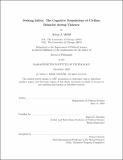Seeking Safety: The Cognitive Foundations of Civilian Behavior during Violence
Author(s)
Milliff, Aidan J.
DownloadThesis PDF (4.719Mb)
Advisor
Petersen, Roger D.
Terms of use
Metadata
Show full item recordAbstract
When people are confronting violence, what determines the strategies they choose in pursuit of safety? Why do some people flee violence, while others try to fight back, adapt, or hide? Individual choices during conflict have real political consequences—from violence escalation to migration crises—but the way people make decisions about safety is poorly understood. I develop and test a political psychology theory, situational appraisal theory, that explains individual behavior by focusing on variation in appraisals of how controllable and predictable violent environments are. I apply situational appraisal theory to explain behavior in two distinct decision-making arenas. One section of the dissertation uses the theory to explain the choices of Indian Sikhs confronting violence during the 1980s–1990s Punjab crisis and 1984 anti-Sikh pogroms. With an original method for combining qualitative analysis and machine-learning measurement to study oral histories, I analyze testimony from Sikh survivors of violence and show that individual appraisals of control and predictability influence strategy selection. People who perceive “low” control over violent threats prefer strategies that avoid rather than approach those threats. People who perceive “low” predictability in threat evolution prefer costly, drastic strategies instead of moderate risk-monitoring options. I bolster these findings by analyzing thirty additional first-hand interviews with survivors of the same violence. Evidence from India shows that situational appraisals explain variation in behavior among demographically similar people, and also provide new leverage to explain change in survival strategies over time. In a subsequent section, I then turn to decision-making in international security to evaluate the generalizability of my theory beyond India. I use a 3,000-person foreign policy survey experiment that manipulates control and predictability appraisals before eliciting preferences for responses to a U.S.–China military crisis. Results from the survey experiment demonstrate the utility of situational appraisal theory beyond the context of pogrom violence. The dissertation concludes by exploring the policy implications of situational appraisal theory for humanitarian and conflict stabilization operations. I advocate for policies that focus more directly on increasing civilians’ sense of certainty and predictability in order to promote adoption of less drastic, less de-stabilizing strategies of survival during conflict.
Date issued
2022-09Department
Massachusetts Institute of Technology. Department of Political SciencePublisher
Massachusetts Institute of Technology